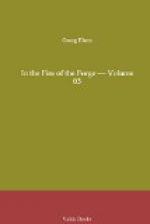And she remembered this longing and yearning in a way very unlike a mere dream. It seemed rather as if, while the moon was attracting her by its magic power, something, which had long slumbered in the depths of her soul, had waked to life; something, from which formerly, ere her heart and mind had been able rightly to understand it, she had shrunk with pious horror, had assumed a tangible form.
Now she dreaded this newly recognised sinful part of her own nature, which she had imagined a pure vessel that had room only for what was noble, sacred, and innocent.
She, too—she knew it now—was only a girl like those on whose desire for love she had looked down with arrogant contempt, no bride of heaven or saint.
She had not yet taken the veil, and it was fortunate, for what would have become of her had she not discovered until after her profession this part of her nature, which she thought every true nun, if she possessed it, must discard, like the hair which was shorn from her head, before taking the vow of the order.
During this self-inspection it became more and more evident that she was not one person, but two in one—a twofold nature with a single body and two distinct souls; and this conviction caused her as much pain as if the cut which had produced the separation were still bleeding.
Just at that moment her eyes fell upon the image of the Virgin opposite, and the usual impulse to lift her soul in prayer took possession of her even more powerfully than a short time before.
With fervent warmth she besought her to release her from this newly awakened nature, which surely could not be pleasing in the sight of Heaven, and let her once more become what she was before the unfortunate ramble in the moonlight.
But the composure she needed for prayer was soon destroyed, for the image of the knight rose before her again and again, and it seemed as if her own name, which he had called with such ardent longing, once more rang in her ears.
Whoever thus raises his voice in appeal to another loves that person. Heinz Schorlin’s love was great and sincere and, instead of heeding the inner voice that warned her to return to prayer, she cried defiantly, “I will not!”
She could not yet part from the man for whom her heart throbbed with such passionate yearning, who was so brave and godly, so ardently devoted to her.
True, it had been peacefully beautiful to dream herself into the bright glory of heaven, yet the stormy rapture she had felt while thinking of him and his love seemed richer and greater. She could not, would not part from him.
Then she remembered her sister’s intention of driving Heinz—Eva already called the knight by that name in her soliloquy—from her presence, and the thought that she might perhaps wound him so keenly that knightly honour would forbid his return alarmed and incensed her.




